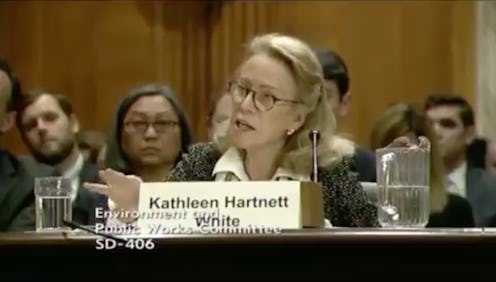News
Trump’s Environmental Council Nominee Couldn’t Answer This Very Basic Science Question
During her Senate confirmation hearing on Wednesday, the nominee to head the Council on Environmental Quality couldn't answer a question about basic science. Kathleen Hartnett White was asked about warming oceans, and she responded honestly.
"Do you think that, if the ocean warms, it expands?" asked Sen. Sheldon Whitehouse from Rhode Island, a Democratic member of the Senate Committee on Environment and Public Works. "Does the law of thermal expansion apply to seawater?" (It does.)
"I do not have any kind of expertise, or even much layman's study, of the ocean dynamics and climate change issues," Hartnett White replied.
Hartnett White is a fossil fuel advocate who insists that human activity may not be the main agent of climate change. Despite her self-proclaimed lack of expertise, she's co-authored a book called Fueling Freedom: Exposing the Mad War on Energy and published several essays arguing for the expansion of fossil fuel-based energy systems and against "climate change alarmism" and "the climate crusade."
"As with so many politicized issues, the climate issue is not about the weather, the environment or energy," she wrote in 2016. "It’s about power, over our economy and over our lives, at the expense of liberty and the human condition."
Hartnett White made similar statements during the hearing, including that "the extent to which ... [humans cause climate change] is very uncertain." Thirteen federal agencies collaborated on a report published this month that concluded that humans are the primary cause of climate change.
When asked about rising carbon dioxide levels, Hartnett White said, "I would not say they’ve gone up drastically." NASA data shows that carbon dioxide levels have shot up dramatically since 1950 and are at their highest level in at least 400,000 years.
If confirmed to lead the Council on Environmental Quality, Hartnett White would be in charge of coordinating environmental policies across the entire federal government. During the Obama administration, the council prioritized sustainability issues and oversaw the implementation of many environmental regulations to combat climate change.
Hartnett White, a senior fellow at the Austin-based conservative think tank Texas Public Policy Foundation, has said that she would like to help cut many of these regulations and refers to them as "red tape." She is in favor of revising the National Environmental Policy Act, signed into law by President Richard Nixon in 1970, which compels federal agencies to analyze how proposals may affect the environment before they are approved. At the Texas Public Policy Foundation, she helps run the group's Fueling Freedom Project, a campaign to deregulate the energy sector.
In addition to asking Hartnett White whether heated ocean water expands, Whitehouse inquired whether she knew the percentage of excess heat trapped in Earth's atmosphere that gets absorbed by the sea.
"Is it more or less than 50 percent? Do you even know that?" he asked.
"No," she said. "But I believe there are difference of opinions on that — that there's not one right answer."
"You think there's serious scientific opinion that it's below 50 percent," Whitehouse said. "OK. Wow."
In fact, over 90 percent of the surplus heat trapped by greenhouse gases in the atmosphere since 1955 has been stored in the oceans. Ocean water — like all water — expands as it heats. The rising sea levels that accompany climate change are caused both by that phenomenon and by melting ice. Rising seas could make over 170 cities across the country uninhabitable in 20 to 80 years, and are already submerging coastline in Florida and other places.
The Senate Committee on Environment and Public Works has 11 Republican and 10 Democratic members. Hartnett White could fail to receive confirmation if even a single Republican decides to vote against her. During the hearing, Republican Sen. Deb Fischer from Nebraska expressed concern over Hartnett White's "lack of understanding" of the Renewable Fuel Standard program, saying, "I worry about your extremist views."
